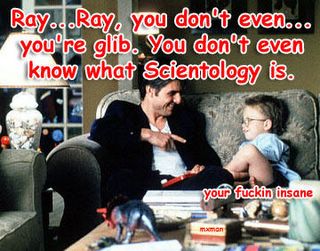With the Supreme Court nomination battles about to be fought, and the Kelo decision still fresh in our minds I think it's important that everyone start to think about the issue of property rights. I am not a lawyer. I don't know the minutiae of regulatory taking standards in the courts, but neither do 99% of America,
but this needs to be the fight. This is meant to be a discussion of the underlying principle of WHY governmental takings are bad. Go read The
Cliffs of Insanity where The Warden does a great job of gathering examples just why this is such an important fight.
From the
NY Times on June 24th.
The Endangered Species Act of 1973 set out a goal that, polls show, is still widely admired: ensuring that species facing extinction be saved and robust populations be restored.
Currently 1,264 species are considered threatened or endangered. Some, like the bighorn sheep of the Southern California mountains, have obvious popular appeal and a constituency, while others, like the Kretschmarr Cave mold beetle in South Texas, are an acquired taste.
There has been a lot of strong opinion expressed on the Kelo decision, a surprising amount of it from the left. It seems that there is near unanimity that the government shouldn't be taking from one person simply to give to another. What about effectively taking someone's property for the benefit of society as a whole?
Everyone is in favor of saving species in danger of extinction, right? It's one of those questions that almost no one even thinks about before answering. Do we really want to save all species equally, though? How much do we want to save species? How do we determine how much we want to save each species?
Normally, when we look at how much we want any given good we look to how much we are willing to pay for it. Lots of squishy types are usually opposed to doing this because it forces people to actually confront how much they want something. They don't like looking at the costs of a societal benefit, so they try to obscure what those costs are. Make no mistake, EVERYTHING has costs.
If, ostensibly, the American people benefit by having the Endangered Species Act, shouldn't it be the government who bears the costs? If someone buys a piece of land to build a house or a shopping center and the government turns around and tells them that they can't because a spotted owl moved onto the land, it effectively takes the value of their property. The government is effectively making THAT citizen bear the cost for preserving that species.
If the government had to actually pay for all the land for which they deny use, it may make people a little more likely to give the matter some critical thought. It might actually make them consider if they were spending their money in the most efficient manner to GET what they are hoping to acquire.
The way the Endangered Species Act is set up and enforced now, if someone discovers an endangered species on their land, what do they have an incentive to do? Shoot, shovel and shutup. Wouldn't it make more sense for the government to ENCOURAGE people to attract and nurture any endangered species on their land? If we as a people are serious about wanting to save endangered species, why not pay bounties to land owners who can prove that they have gotten those species onto his land. It would also of course force us to determine exactly how much we are willing to pay for any given species. I doubt we'll see a "save the smallpox" campaign.
It is the Endangered Species Act and many others like it that the left will use to oppose any fight on property rights during the nomination battle. Time for people to hone their counterarguments.
Did another fight on this front just begin?








